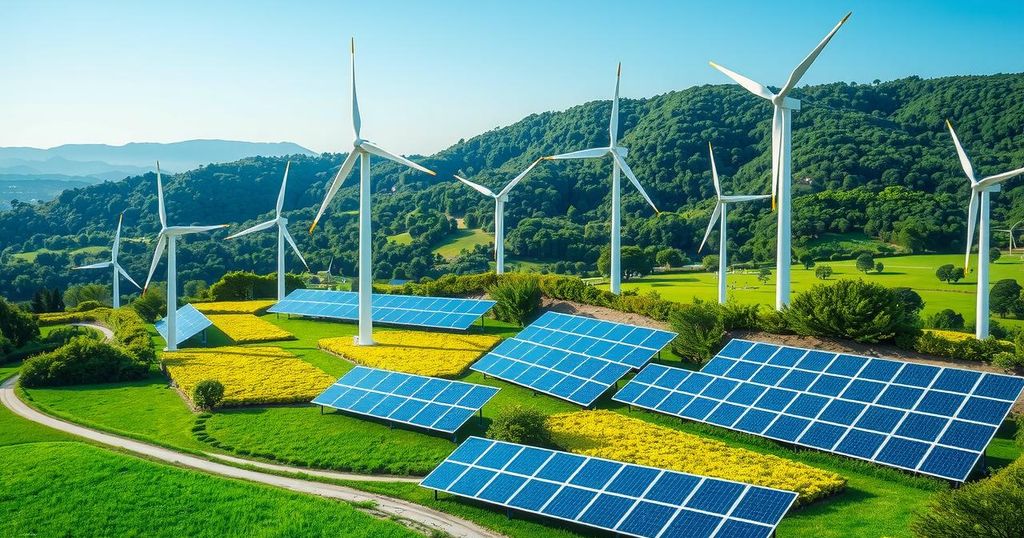China-Latin America Energy Cooperation: A New Frontier

China and LAC nations are set to deepen energy cooperation, highlighted by new agreements from their recent forum. These initiatives will focus on combating climate change while securing energy resources. By leveraging each other’s strengths, they aim to transition towards cleaner energy and enhance economic growth, serving as a model for collaboration in the Global South.
A new era is unfolding in energy cooperation between China and Latin America and the Caribbean (LAC). Since President Xi Jinping first introduced the concept of a cooperative partnership with the region back in 2014, significant strides have been made. At the recent fourth ministerial meeting of the China-Community of Latin American and Caribbean States Forum, held in Beijing, officials adopted a declaration and a joint action plan aimed at shaping cooperation for the next three years. These documents promise specific strategies to enhance collaboration, particularly in the energy sector.
In today’s climate, where extreme weather events wreak havoc globally, addressing climate change remains a paramount challenge. Both Asia and LAC countries are grappling with severe disruptions due to climate-related disasters. Thus, enhancing energy cooperation is essential—not just to combat climate change but also to secure energy resources across the board. The recent extreme heat and drought seen in places like the Yangtze River basin and impacts felt in Brazil and Colombia underscore the urgency of this cooperation.
Extreme weather is increasingly becoming a nightmare for electricity generation and supply chains. For instance, the summer of 2022 saw crushing drought affecting the Yangtze River, crippling power supplies for countless individuals. In 2023, the El Niño phenomenon has caused widespread power outages in Latin American nations, highlighting the critical need for joint action on energy. There’s a strong consensus among global leaders, including President Xi, that development of clean energy is key to tackling climate issues.
China is ramping up efforts to expand its clean energy output, ensuring reliable energy supplies for its populace. LAC nations, rich in clean energy resources, have a clear path toward achieving similar goals. Closer collaboration between China and LAC in this area could yield significant advancements in generating clean energy, particularly through sources like hydropower, wind power, and solar energy.
This partnership is not merely a mutual benefit; it stands to help LAC countries pursue their economic ambitions and improve living standards while aiding wider global transitions, especially among developing countries. Insights gained from Brazil’s green energy development could greatly enhance Chinese efforts, while China’s vast experience in solar and wind energy technologies can assist the LAC region significantly. In fact, Brazil is making incredible strides; data shows their solar power generation increased by 15.2 GW in 2024, a testament to strategic policy measures in place.
Brazil’s net metering policy is particularly influential, mandating a huge increase in solar installations, allowing citizens to sell excess energy back to the grid. Such frameworks will be pivotal lessons for LAC nations. In return, these countries can glean insights from China’s pioneering clean energy demonstration sites, employing wind and solar installations even in challenging terrains.
Moreover, as LAC seeks to boost its renewable infrastructure, strengthening the resilience of its power grids is essential. This includes enhancing storage capabilities and fine-tuning peak load management to ensure sustainable energy practices. China’s advancements in smart grid technology demonstrate effective resource management and could be a critical asset for LAC countries aiming to advance their digital infrastructures.
The potential for cooperation is vast, presenting opportunities to tackle climate change and facilitate energy transitions collectively. An open market approach between China and LAC can significantly promote enterprise-driven collaborations in the clean energy domain. Altogether, strengthening ties between these regions is paving a path for mutual advancement and prosperity, potentially serving as a beacon of solidarity for nations in the Global South.
In conclusion, the cooperation between China and LAC countries presents a promising opportunity for both regions to enhance energy security and tackle climate change. The recent meetings and agreements underscore a commitment to mutual development, emphasizing clean energy generation. Through energy collaborations, both sides stand to benefit economically and environmentally, fostering a model of partnership that could inspire broader global cooperation.
Original Source: www.chinadaily.com.cn






